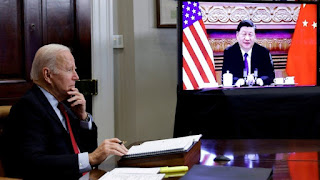The Taiwan interrogation is the most fault finding and most delicate matter in the relations between Beijing and the washing tone. The three Sino-US joint sendoff are the reason for the solid and compatible advancement of relations between the two nations. At the heart of the gap is that the Beginning government apprise Taiwan to be a dissenting territory that will, in the long run, be essential for the nation once more. A great many Taiwanese individuals dispute. They believe they as a result have a different country - whether freedom is at any point formally proclaimed.
What is the history of this tension?
Lets shed some light on
the history and also talk about with a bit detail about the tension between the
Taiwan and China and also the US. History explain it in the different way from beginning to the current era US all time
criticizing the China over the matter of
Taiwan and some time about the trade war when the trade war is running in the
sluggish way US flare up the matter of Taiwan. Returning to the start - the
fundamental known pilgrims in Taiwan were Austronesian ancestral specific., who
are think off to have come from cutting edge southern China. The island appears
to have first showed up in Quite a while in AD239, when a head sent an
expeditionary power to investigate the region - something Beijing uses to back
its regional case. After a somewhat concise spell as a Dutch province
(1624-1661), Taiwan was directed by China's Qing line from 1683 to 1895. Relations
among China and Taiwan began working on during the 1980s. China set forward an
equation, known as "one country, two frameworks", under which Taiwan
would be given huge independence in the event that it acknowledged Chinese
reunification. This framework was laid out in Hong Kong to be utilized as
something of an exhibit to tempt Taiwanese individuals back to the central
area. Taiwan dismissed the deal, yet it loosened up rules on visits to and
interest in China. In 1991, it likewise declared the conflict with the People's
Republic of China on the central area to be finished. There were additionally
restricted talks between the different sides' informal agents, however
Beijing's demand that Taiwan's Republic of China (ROC) government is
ill-conceived implied government-to-government gatherings couldn't occur.
So who recognises Taiwan?
There
is disagreement and confusion about what Taiwan is.
China
regards Taiwan as a breakaway province which it has vowed to retake, by force
if necessary. But Taiwan's leaders say it is clearly much more than a province,
arguing that it is a sovereign state.
It has
its own constitution, democratically-elected leaders, and about 300,000 active
troops in its armed forces.
Chiang
Kai-shek's Republic of China (ROC) government, which fled the mainland to
Taiwan in 1949, at first claimed to represent the whole of China, which it
intended to re-occupy. It held China's seat on the United Nations Security
Council and was recognized by many Western nations as the only Chinese
government.
But in
1971, the UN switched diplomatic recognition to Beijing and the ROC government
was forced out. Since then the number of countries that recognize the ROC
government diplomatically has fallen drastically to about 15.
The US and Chinese leaders have warned each other over Taiwan
during a phone call that lasted more than two hours.
President Joe Biden told his Chinese counterpart, Xi Jinping,
that the US strongly opposed any unilateral moves to change the island's
status.
But he added that US policy on Taiwan had not changed. Beijing said Mr Xi had told Mr Biden to abide by the one-China principle, warning him that
"whoever plays with fire will get burnt". Tensions over the issue have increased ahead of a rumoured plan
for US House of Representatives Speaker Nancy Pelosi to visit Taiwan. The state department says Ms Pelosi has not announced any
travel, but China has warned of "serious consequences" if she were to
proceed with such a visit. Last week, Mr Biden told reporters "the military thinks
it's not a good idea", but his White House has called Chinese rhetoric
against any such trip "clearly unhelpful and not necessary". Ms Pelosi, who is next in line to the presidency after the
vice-president, would be the highest-ranking US politician to travel to Taiwan
since 1997 During Thursday's phone call, Mr Biden and Mr Xi also discussed
arranging a possible face-to-face meeting, a senior Biden administration
official said, describing the bilateral as "direct" and "honest". When Mr Biden was US vice-president he hosted Mr Xi during a
visit to the US by the Chinese leader in 2015, but they have not met in person
during Mr Biden's presidency. China sees Taiwan as a breakaway province that must become a
part of the country - and has not ruled out the possible use of force to
achieve this. Under the one-China policy, Washington does not recognise Taipei
diplomatically. But the US does sell weapons to the democratically
self-governed island so that it can defend itself.
The White House said that apart from Taiwan, the two leaders discussed a range of other issues, including climate change and health security. The Biden administration has been considering whether to lift Trump-era tariffs on Chinese imports, arguing that such a move could ease soaring US inflation. But the US president did not discuss that issue with Mr Xi on Thursday, the senior US official said. In a brief summary, the White House said it was part of efforts to "responsibly manage differences" and work together where "interests align". In a much longer one, Beijing said many of their interests did align. But it blamed the US for the deteriorating relationship, criticising the Biden administration's view of China as a "primary rival" and Washington's "most serious long-term challenge."



.jpg)
.jpg)
.jpg)
No comments:
Post a Comment
if you have doubts. Please let me know.